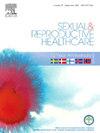The importance of clinical supervision and teaching methods for midwifery students’ confidence in intrapartum care. A mixed method study
IF 1.7
3区 医学
Q3 PUBLIC, ENVIRONMENTAL & OCCUPATIONAL HEALTH
引用次数: 0
Abstract
Objective
Midwifery students’ need to be confident, and it is important to identify factors that might affect students’ confidence. Achieving registration as a midwife requires academic, clinical and professional competence. In the 1,5-year post-nursing program in Sweden 50% is allocated to clinical practice, and students must assist a minimum of 50 births. There is a lack of knowledge regarding the significance of supervision and to consider both theoretical and practical aspects of midwifery education. This study intends to identify relationships between midwifery students’ confidence in intrapartum care and associated factors. An additional aim was to provide a member check of the validity of the findings.
Methods
All midwifery programs in Sweden participated in this cross-sectional study, where 238 (78%) midwifery students completed a questionnaire based on the competency descriptions by the International Confederation of Midwives. Confirmatory interviews were conducted for checking the results relevance.
Result
The organization of midwifery education, satisfaction with supervision and theoretical teaching significantly impacted students’ confidence. Few background variables were associated with confidence.
Conclusion
Clinical supervision was important. Students preferred lectures and practical demonstrations instead of self-studies. The structure and quality of both practical and theoretical training are crucial for building confidence. Newly graduated midwives qualitatively confirmed the results of the analysis. They also experienced a stressful environment, only focusing on to assist at the required 50 births.
临床督导及教学方法对助产学生产时护理信心的重要性。混合方法研究
目的产科学生需要自信,识别可能影响学生自信的因素具有重要意义。注册成为助产士需要具备学术、临床和专业能力。在瑞典的1.5年护理后课程中,50%分配给临床实践,学生必须协助至少50个分娩。关于监督的重要性以及考虑助产士教育的理论和实践方面的知识缺乏。本研究旨在探讨助产学学生对产时护理的信心与相关因素的关系。另一个目的是提供对调查结果有效性的成员检查。方法瑞典所有助产专业均参与了本横断面研究,238名(78%)助产专业学生完成了一份基于国际助产士联合会能力描述的调查问卷。进行验证性访谈以检查结果的相关性。结果助产学教育组织、督导满意度和理论教学对学生信心有显著影响。很少有背景变量与置信度相关。结论临床监督是重要的。学生们更喜欢讲座和实际演示,而不是自学。实践和理论培训的结构和质量对建立信心至关重要。新毕业的助产士定性地证实了分析结果。他们还经历了一个充满压力的环境,只专注于协助所需的50个分娩。
本文章由计算机程序翻译,如有差异,请以英文原文为准。
求助全文
约1分钟内获得全文
求助全文
来源期刊

Sexual & Reproductive Healthcare
PUBLIC, ENVIRONMENTAL & OCCUPATIONAL HEALTH-
CiteScore
2.70
自引率
5.60%
发文量
73
审稿时长
45 days
 求助内容:
求助内容: 应助结果提醒方式:
应助结果提醒方式:


